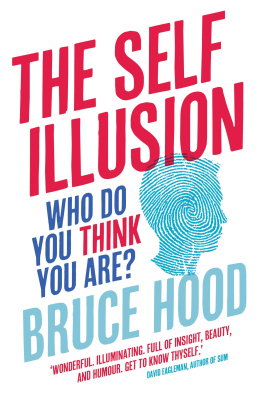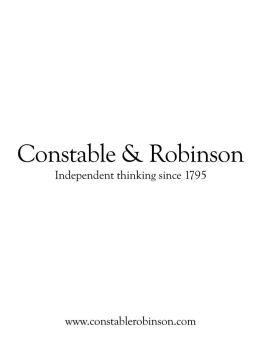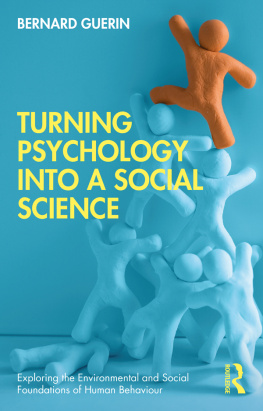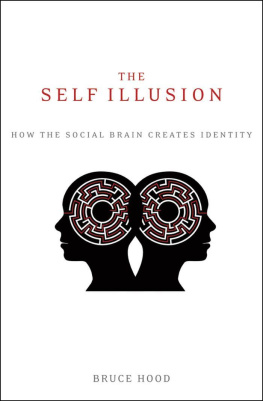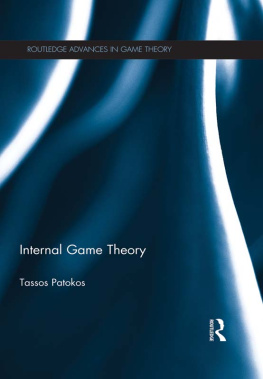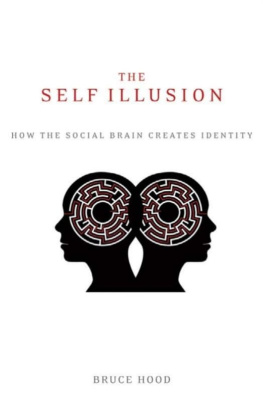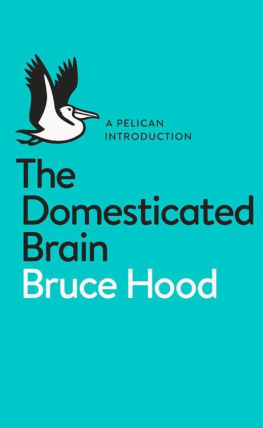The Self Illusion
Also by Bruce Hood
SuperSense: From Superstition to Religion the Brain Science of Belief
The Self Illusion
Bruce Hood
CONSTABLE LONDON
Constable & Robinson Ltd
5556 Russell Square
London WC1B 4HP
www.constablerobinson.com
Published in the US by Dutton, a division of Penguin Group (USA) Inc., 2011
First published in the UK by Constable,
an imprint of Constable & Robinson Ltd, 2012
Copyright Bruce Hood, 2012
The right of Bruce Hood to be identified as the author of this work has been asserted by him in accordance with the Copyright, Designs and Patents Act 1988
All rights reserved. This book is sold subject to the condition that it shall not, by way of trade or otherwise, be lent, re-sold, hired out or otherwise circulated in any form of binding or cover other than that in which it is published and without a similar condition including this condition being imposed on the subsequent purchaser.
A copy of the British Library Cataloguing in
Publication data is available from the British Library
ISBN: 978-1-78033-007-5
eISBN: 978-1-78033-137-9
Printed and bound in the UK
1 3 5 7 9 10 8 6 4 2
Contents
PROLOGUE
The Reflected Self
Last night I finished reading the biography of Howard Hughes the tycoon, the aviator, the movie mogul, the socialite and finally the reclusive billionaire, housebound by his pathological fear of dirt. At the time of his death, Hughes was worth $2 billion but he ended his days as an unwashed recluse, dressed in rags with long, matted hair, curling nails and the remnants of five hypodermic needles embedded in his arms. Throughout his life he was a man of multitudes and paradoxes. He loathed social contact but then pursued and bedded hundreds or reputedly thousands of women. He would spend lavishly on fanciful movie projects and young starlets but then quibble over a few dollars on the expense sheet. He was a brash, fearless pilot who regularly placed himself at risk during the pioneering days of aviation when he set and broke many speed and distance records, and yet his obsessivecompulsive disorder compelled Hughes to be terrified of dying from germs. His close confidant and advisor, Noah Dietrich, explained in his memoir, There was more than one Howard Hughes.
This got me thinking. Are there people like that today? In recent years there have been Britney, Mel, Winona and Tiger: they all seem to have skeletons in their closets or at least dark sides to their personalities that are so at odds with their public profiles erratic behaviours that seem so uncharacteristic. The gossip columns thrive on uncovering the hidden truths about celebrities, but are we mere mortals any different? Most of us believe that we are individuals making our own decisions and true to our self, but are we? We may not swing from one extreme to the next as Howard Hughes famously did, but are we more coherent? Is there a single you?
These questions may seem illogical to many. We are so familiar and comfortable with the experience of our self that to question it implies that we may be suffering from mental illness. Almost like asking if we are real or not? And yet, that is the question that is addressed here. Are we all mistaken when it comes to knowing who we are?
Each morning, we wake up and experience a rich explosion of consciousness the bright morning sunlight, the smell of roast coffee and, for some of us, the warmth of the person lying next to us in bed. As the slumber recedes into the night, we awake to become who we are. The morning haze of dreams and oblivion disperses and lifts as recognition and recall bubble up the content of our memories into our consciousness. For the briefest of moments we are not sure where we are and then suddenly I, the one who is aware, awakens. We gather our thoughts so that the I who is conscious becomes the me the person with a past. The memories of the previous day return. The plans for the immediate future reformulate. The realization that we have things to get on with reminds us that it is a workday. We become a person whom we recognize.
The call of nature tells us that it is time to visit the bathroom and en route we glance at the mirror. We take a moment to reflect. We look a little older, but we are still the same person who looked in that same mirror every day since we moved in. We see our self in that mirror. This is who we are.
This daily experience of our self is so familiar and yet the brain science shows that this sense of our self is an illusion. The psychologist Susan Blackmore makes the point that the word illusion does not mean that it does not exist rather, an illusion is not what it seems. We all certainly experience some form of self but what we experience is a powerful deception generated by our brains for our own benefit.
But there is a real difficulty in discussing the self illusion. Throughout this book, the terms I, me, my, mine, you, yours, our, us and we are used, which all imply the existence of a self or multiple selves. (I also separate words such as yourself into your self and ourselves into our selves for the sake of emphasis.) You might conclude that the premise that the self is an illusion must be false because these terms already acknowledge the existence of the self in the first place. The problem is that there is no simple way around discussing the self without using these words that refer to this human experience most of us have.
Second, understanding that the self could be an illusion is really difficult. It may be one of the most, if not the most, difficult concept to accept. Our self seems so convincing, so real, so us. But then again, many aspects of our experiences are not what they seem. Take the most lucid experience that you are having right now as you read these words. As your eyes flit across the page, your visual world seems continuous and rich but you are actually only sampling a fraction of the text one bit at one time, rarely reading all the letters in between. Your peripheral vision is smeared and colourless, yet you could swear that it is perfectly clear just like the centre of your visual field. There are two blindspots, the size of lemons at arms length, just off-centre from your field of view that you do not even notice. Everything in your visual world is seamless and unbroken, yet your visual world is blacked out for a fraction of a second between eye movements. You are not made aware of any of these imperfections because our brain provides such a convincing cover story. The same deception is true for all human experience from the immediacy of our perception to the contemplation of inner thoughts, and that includes the self.
In challenging what is the self, what most people think is that the self must first be considered. If you were to ask the average person in the street about their self, they would most likely describe the individual who inhabits their body. They believe they are more than just their bodies. Their bodies are something their selves controls. When we look in the mirror, we regard the body as a vessel we occupy. This sense that we are individuals inside bodies is sometimes called the ego theory, although the philosopher Galen Strawson captures it poetically in what he calls the pearl view of the self. This pearl view is the common notion that our self is an essential entity at the core of our existence that holds steady throughout our life. This ego experiences life as a conscious, thinking person with a unique historical background that defines who he or she is. This is the I that looks back in the bathroom mirror and reflects upon who is the me.
In contrast to this ego view, there is an alternative version of the self, based on the bundle theory after the Scottish Enlightenment philosopher, David Hume. Three hundred years ago in a dull, drizzly, cold, misty and miserable (or driech as we Scots love to say) Edinburgh, Hume sat and contemplated his own mind. He looked in on his self. He tried to describe his inner self and thought that there was no single entity, but rather bundles of sensations, perceptions and thoughts piled on top of each other. He concluded that the self emerged out of the bundling together of these experiences. It is not clear whether Hume was aware of exotic Eastern philosophy but in the sixth century BC, thousands of miles away in much warmer climates, the young Buddha, meditating underneath a fig tree, had reached much the same conclusion with his principle of anatta (no self). Buddha was seeking spiritual rather than intellectual enlightenment and thought that this state could only be achieved by attaining anatta through meditation.

